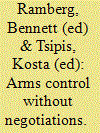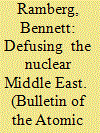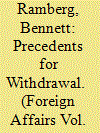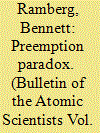| Srl | Item |
| 1 |
ID:
004359


|
|
|
|
|
| Publication |
Cambridge, MIT Press, 1993.
|
| Description |
xv, 210p.
|
| Standard Number |
026213344x
|
|
|
|
|
|
|
|
|
|
|
|
Copies: C:1/I:0,R:0,Q:0
Circulation
| Accession# | Call# | Current Location | Status | Policy | Location |
| 035097 | 327.174/RAM 035097 | Main | On Shelf | General | |
|
|
|
|
| 2 |
ID:
051680


|
|
|
|
|
| Publication |
May-Jun 2004.
|
| Description |
May-Jun 2004
|
| Summary/Abstract |
It would take some doing, including the imposition of an effective enforcement mechanism, but a nuclear-free zone could be the best answer to proliferation in the Middle East
|
|
|
|
|
|
|
|
|
|
|
|
|
|
|
|
| 3 |
ID:
086020


|
|
|
|
|
| Publication |
2009.
|
| Summary/Abstract |
In November 2008, the governments of the United States and Iraq agreed that U.S. troops would leave Iraq by 2011 -- eight years after the U.S. invasion. For some, this is much too soon. These critics argue that events on the ground, not an artificial deadline, should govern the pullout and that, in any case, a residual force should remain for decades.But as Washington ponders how long to stay in Iraq, it would do well to examine the strategic impact of the United States' withdrawal from other conflict-riven countries: Vietnam and Cambodia in the 1970s, Lebanon in the 1980s, and Somalia in the 1990s. Even though Washington's commitment to these situations differed in its degree, disengagement eventually proved to be the right policy for the United States. Abandonment damaged Washington's credibility at first, but it was the best way to protect U.S. interests in the long run. The dominoes did not fall after the United States left Southeast Asia; Moscow did not fill the power vacuum in Lebanon; Washington has been largely unaffected by the failed state of Somalia. In each case, after the United States exited, its adversaries became preoccupied with consolidating power and embroiled themselves in conflicts with neighboring countries. A regional stability of sorts emerged, leaving Washington's vital interests intact. For
|
|
|
|
|
|
|
|
|
|
|
|
|
|
|
|
| 4 |
ID:
072243


|
|
|
| 5 |
ID:
084289


|
|
|
| 6 |
ID:
081460


|
|
|